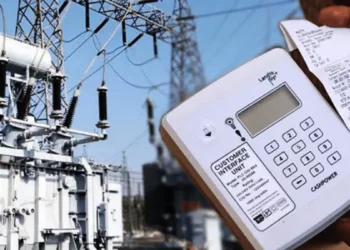The Senate yesterday approved President Muhammadu Buhari’s request to borrow $22.7 billion.
The loan was requested by the president in order to fund critical infrastructure projects under the 2016–2018 External Borrowing Plan.
Analysts say the fund, if well utilized, would facilitate infrastructural development in the country.
Although the process of approval led to an uproar in the upper chamber as some senators kicked against it, other senators supported the approval.
During the debate, Minority leader, Enyinnaya Abaribe cautioned the Senate against considering all the recommendations on the loan at once. According to him, it would be better if the recommendations were done one after the other. However, his motion was countered by Senate President Ahmad Lawan.
Senator Adamu Aliero (Kebbi Central) had also suggested that consideration of the report be postponed to another legislative day. The Senate President did not agree with that, as he explained that such a postponement would be counterproductive as the findings and recommendations of the report would have already been debated in the media before the consideration.
He advised that the report be considered to forestall such eventuality. The Senate later went into an executive session where it was concluded that Buhari’s request should be approved.
Recall that this loan request was previously rejected by the 8th Senate under Bukola Saraki’s leadership. This was due to the fact that there was no detail in the document which held the request.
Last December, Buhari presented the loan request of $29.96 billion again but it was reduced to $22.7 billion, with claims that the 8th National Assembly had already approved about $6 billion out of the money.
Meanwhile, reports have it that the bulk of the loan would come from the Islamic Development Bank, African Development Bank, the World Bank and banks from China, Japan and Germany.
According to the report by the upper lawmaking chamber, the loan is earmarked as follows:
Rural water supply and sanitation – $150,000,000 (Taraba, Borno, Yobe and Gombe)
Agriculture, Transformation Agenda Support Project $200,000,000 (Nationwide)
Staple Crops Processing Zone Projects $500,000,000 (Nationwide)
Institutional-Strengthening and implementation of policy reforms $33,750,000 (Domiciled at the Federal Ministry of Works and Housing)
Emergency Road Rehabilitation and maintenance $434,700,000 (Federal Ministry of Transportation)
Development Finance Project $450,000,000 (Federal Ministry of Finance)
Lake Chad Basin Commission $13,000,000 (Nigeria, Chad, Niger, Cameroon Libya, and the Central African Republic)
Power Sector: Nigeria Electricity Transmission and Access Project, Power Transmission Project, TCN overall Transmission system enhancement project, vocational training in the power sector and Mambila Hydro Electricity Power Project $5,614,000,000
Ministry of Communication and Digital Economy: National Information and Communication Technology Infrastructural Backbone by Galaxy Backbone (Phase II) – $328,108,731
Education Sector: Education Sector Reform Programme renamed Better Education Service Delivery for All – $500,000,000
Ministry of Niger Delta Affairs: East-West Road Project – $800,000,000
Information and Culture Ministry: NTA Digitization Project – $500,000,000
Mines and Steel Sector: Development of the Mining Industry Project – $150,000,000
Federal Capital Territory: Greater Abuja Water Project – $381,095,037 and Abuja Mass Rail Project – $1,252,293,005
Transportation Sector: Lagos-Kano Railway Modernization Project (Ibadan=Kano Segment Double Track) – $5,530,000,000
Railway Modernization Coastal Railway Project (Calabar-Port Harcourt-Onne Deep Sea Port Segment – $3,474,000,000
Ministry of Health: Regional Disease Surveillance System Enhancement (REDISSE) Project in West Africa – $90,000,000.
Ministry of Humanitarian, Disaster Management and Social Development: Social inclusion and welfare advancement project now (National Social Safety Net Project) $800,000,000
Katsina State: Health System Projects $110,000,000
North-East Nigeria Integrated Social Protection, Basic Health, Education, Nutrition Services and Livelihood Restoration Project – $100,000,000
Meanwhile, the federal government will fund highway projects using Sukuk bonds. The bonds, valued at N150 billion are being issued by the Debt Management Office in financing 44 ongoing highway projects across the country, according to the Minister of State for Works and Housing, Abubakar Aliyu.
Mr. Aliyu said the federal government had to leverage alternative sources of funding to finance infrastructure, due to the paucity of funds.
He disclosed this on Thursday at the ongoing Summit on National Policy and Development in Abuja.
The summit was organised by the Office of the Senior Special Assistant to the President on Policy Development and Analysis with the theme: “Actualising the Next Level Agenda: Strategies, Prospects, and Anticipated Challenges.”
The minister said the federal government spent N200 billion raised through Sukuk bonds on 58 critical highway projects across the country between 2017 and 2018.
He said 25 of these projects were funded in 2017 and 28 in 2018.
“The expansion, reconstruction, and rehabilitation of Lagos-Ibadan road, Construction of Second Niger Bridge and the Rehabilitation of Abuja-Kaduna-Kano Dual Carriageway are being financed with the Presidential Infrastructure Development Fund (PIDF),” he said
He said the concerted and sustained effort in road infrastructure financing had positively impacted on the “physical completion of many of the projects”.
Mr. Aliyu said in bridging the infrastructure gap in the country, his ministry is also intervening in tertiary institutions’ internal road networks across the country through the reconstruction of internal roads in 44 tertiary institutions across the country.
“This forms part of the over 500 road and bridge projects currently being undertaken by the ministry as its contribution to infrastructure provision in the country,” he said.
He said President Muhammadu Buhari has prioritised the provision of basic road infrastructure “because it is a necessary prerequisite for the socio-economic development of any nation.”
He said policies have been put in place to encourage the private sector to partner with the government in the provision of these critical infrastructures.
“The Road Infrastructure Development and Refurbishment Investment Tax Credit Scheme (RIDRITCS) through which projects like the Apapa-Oworonshoki road, Obajana-Kabba road, the Bodo-Bonny road, and the Apapa-Wharf road are being executed by private firms,” he said.
Speaking on the housing sector, Mr. Aliyu said the National Housing Programme is ongoing across the country with over 2,500 units completed in 34 states of the federation.
The Federal Mortgage Bank and the Federal Housing Authority are also increasing the housing stock to Nigerians through several programmes designed to achieve this, like, rent-to-own, mortgage finance ownership, etc. , he added.



